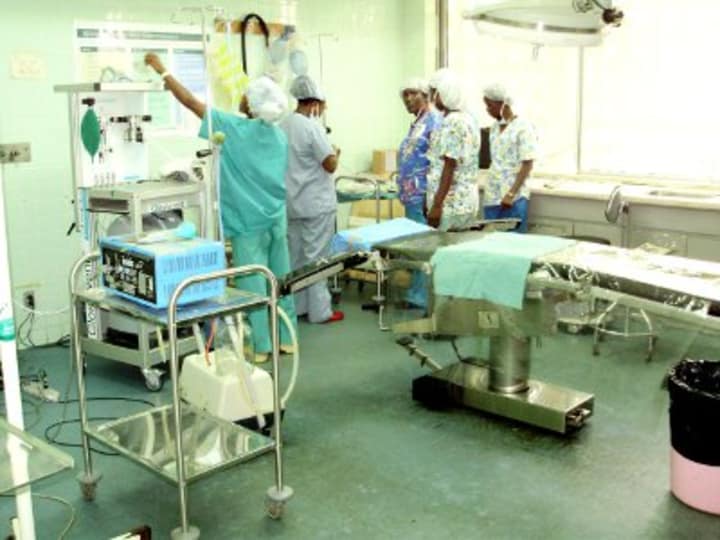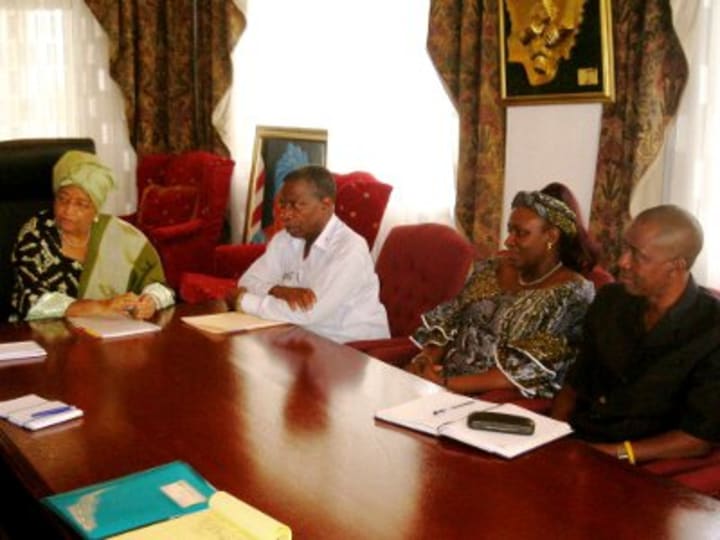
Just a few years ago, Liberia laid in shambles, its work force depleted, its health facilities destroyed. The country is still recovering from more than 10 years of civil war – but it has also become an unlikely test case for a provocative, cutting-edge funding mechanism that may just catch on as donors channel more assistance through recipient country systems.
Liberia now administers a unique multidonor trust fund that allows international donors to funnel money directly into the country’s health system. The effect: Donors don’t work with implementing organizations directly; instead, the Liberian government contracts with health institutions using funds raised domestically as well as from international donors.
>> GUEST OPINION: Why a New Multidonor Trust Fund, Managed by Aid Recipients in Liberia, Works
The idea is not without skeptics who worry about corruption and question the recipient government’s ability to efficiently handle the increase in procurement. But Liberia’s example is being closely watched by a donor community eager to increase aid effectiveness and put recipient countries in the driver’s seat of their own development.
So far, Liberia’s so-called Health Sector Pool Fund is supported by the U.K. Department for International Development, Irish Aid and the United Nations. But if it proves successful, more donors may contribute – or find other ways to funnel development aid into the Liberian government’s budget to train and pay midwifes, nurses and doctors and provide adequate health facilities, equipment and medication. These donors could include international institutions such as the Global Fund to Fight AIDS, Tuberculosis and Malaria, as well as bilateral donors such as the U.S. Agency for International Development, which – as part of its USAID Forward reform strategy – plans to channel 20 percent of its foreign aid through national systems by 2014.
The central player in Liberia’s efforts to win over donors is Health and Social Welfare Minister Walter Gwenigale, one of the most well-connected global health experts who has served on the World Health Organization’s executive board and the Roll Back Malaria board.
Devex spoke with the surgeon and former CEO of Phebe Hospital (located in Bong in central Liberia) during his recent visit to Washington about innovative ways to engage donors and how the Health Sector Pool Fund helps to strengthen the social contract between citizens and government.
Liberia is a rare example for a country recovering from crisis that has convinced donors to channel assistance for health care through country systems.
Right now, the money we are getting from outside for health, most of it goes into a basket that we call the Health Sector Pool Fund. But, you have to be able to get to that stage. And the way to get there is, first, to make sure that you can properly account for the money that you have that has been given to you by people. And you got to be able to be transparent with how you use it.
When you talk about budget support, that’s a completely different thing because sometimes, if the donor gives the money to the government and says, “We want you to use this for health,” one of two things may happen: Either the [recipient] government will take that and pass it on to health, and not give their own money to health. But if you put it in a basket, we can use it from the basket for health and still go to the government for our own money that we can supplement with the basket funding.
For us to be able to get the money that we are getting for the Pool Fund, we first had to get our people trained in financial management, because that was what was lacking. During the war, people ran away, and the people who were available were not necessarily the best-trained people. So for us to be able to account for people’s money, we had to go and say: “Can you help us train our people?” Not only did we have to train people, they [had to be] able to show that they can account for the money, that they can report back on the money.
Then, the next thing was: Trust has to be earned. So, it’s good that we have a president who has been a former international civil servant who insists on transparency, who insists on being trustworthy. So, she demands that of us, and some of us who have worked in private institutions demand that of ourselves too.
[That has increased international donors’] confidence in us, so that we can work with them in what we call the Pool Fund Steering Committee, which is made up of government ministries and the donors, to look at how that money is used. So, that, I think, has helped us to be able to get the funding that we need and report on it properly.
Now, the funny thing is that whereas donors would insist that we be transparent, we are also insisting that they, too, have to be transparent. Because if you come and say to me, “I’m giving you $50 million for five years,” but I don’t see one penny of that money because you go and contract somebody to use that money on your behalf in my country and they use the money without my involvement and they use the money without any accountability to me, in the end I don’t know how much of your $50 million was used in my country. So, it’s very important that if you ask me to be transparent, that you, too, should be transparent – first, by telling me how much you have given to what NGO to do the work for me and for that NGO to give me a financial report as to how much of the money that was given to them for me was used for me. So, transparency should not only be required of me, but should be required of the donor who gives me the money.

Liberia’s Health and Social Welfare Minister Walter Gwenigale (center) in a meeting with Liberian President Ellen Johnson Sirleaf (left) and Deputy Health and Social Welfare Ministers Vivian J. Cherue and S. Tomorlah Varpilah (right).
How difficult was it, really, to get international institutions to open up to you that way?
Well, we are getting there. It’s not been easy, but you have to insist on it. You have to insist. I had people come to me for meetings to discuss a project and I’ve had to say, “I’m not ready to talk with you today because I haven’t seen any report from you. Until I have seen a report from you, goodbye.” And I did get a response. So, the thing is that you also have to be able to know what you want to do and with what you want to do it.
Now, if I have my priorities set and I say, “I’m looking for money to do a, b, c and d,” and you come and say to me, “I’m not interested in your priorities; I have money to do different things,” I should not just accept your money because it is available. I should accept your money because it is the money that I need to do what I need to do. So, the money has to be tied to my priorities. I should be strong enough to say, “I will let your money go because it would not address my issue.”
Not every country has a head of state who has held a senior post within the U.N. system or another international organization. How do such countries, especially in a post-crisis situation, build the trust necessary to win international assistance?
Countries are different, and I cannot decide for a ministry what they should do if their head of state wants to put their hand in the cookie jar and take the health money for something else. I don’t know how to advise them. But I know that it is very important to have a head of state that supports your principles and that wants to see that you do the right thing.
Which of the new financing mechanisms donors are testing out these days do you see as promising on a larger scale?
Our own situation now, I think, is beginning to work for us. For instance, because we have tried to be transparent with our work, those people who have been supporting international NGOs, like DfID, they have come to say, “From now on, we will not give any money to any international NGOs; we will give you the money and you can contract them if you want them to work with you.” That is easier for us because there have been NGOs in the past who did their own thing irrespective of what the government wanted. But if you give us the money and we have to contract you, then we know how much we are giving and for what. And you have to report on it before you can get more money. So, that’s one of the things that accountability and transparency can do for a nation.
It also shows the population that it is the government [that is helping], even though the money is from abroad. If I go to my people and say, “I’m contracting this NGO, I’m paying them to do this,” even though the money didn’t come from me – it came from abroad – I would be seen as a government that is doing it. So, it shows that the government is providing for its people because I’m saying to them, “The money is for us, we are contracting this NGO.”
When the NGO gets the money [directly] from the donor country and we don’t know how much [it receives] from the donor and they do what they do with it, and they put their name on a clinic, they are really not helping to promote the government. They assume the government is not able to provide for its people.
Your 10-year health strategy also addresses issues such as noncommunicable diseases, a growing challenge for the developing world. What’s your approach?
The thing is, the country is changing radically. First, we have had tropical diseases, neglected ones, we’ve had noncommunicable diseases – all of these things, we are seeing them now. And with the change in lifestyles, we are now identifying more cases of hypertension, more cases of stroke. We are now seeing more people with diabetes. We are seeing people now with obesity.
Now, these things, we have to pay attention to it because it’s part of our health problem now.
The problem is, here we are identifying them as a thing to deal with. It depends on how we can get the funding to keep on hand the insulin or the drug for diabetes, to keep on hand the drug for hypertension: These things are the most expensive ones. But, these are the conditions that our people have, so we have to be able to take care of them. So, we cannot just close our eyes to them as if they didn’t exist.
How are you going to pay for it? What is your vision for how Liberia will be funding its health system in 10 years?
That’s what I’m trying to look at. That’s why we created the 10-year plan. That’s why we are saying, “That’s what we should do in 10 years.” I don’t know what it will look like, but that’s why we are now completing a 10-year plan.
So, the hope is what we are saying to ourselves – that in 10 years, we want to have a healthy population with social security. We want to have a population that is healthy in 10 years. Now, that’s a challenge. I don’t know all the things that it would take to get there, but if you don’t plan for it, if you don’t pay attention to it, you will never get there.
Find out more:




